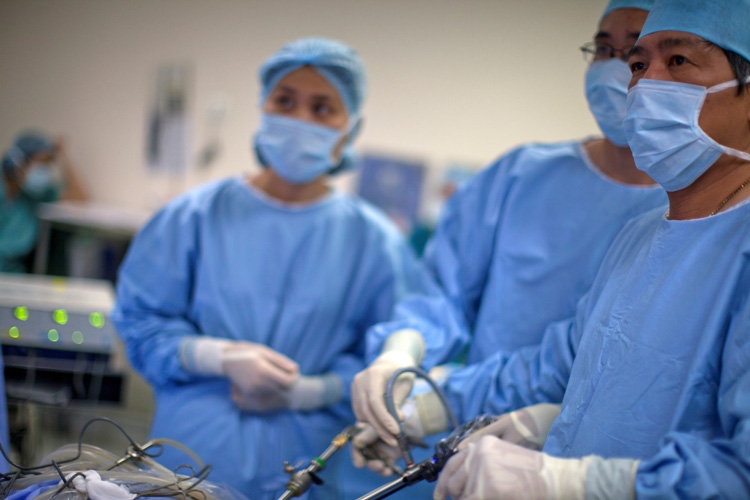Admitted to FV Hospital with septic shock due to a ruptured appendix, five-year-old Korean girl J.M.M. was in a critical condition. Doctors at FV Hospital tried their best to save her life.

J.M.M. came to Vietnam with her parents two years ago. In early January 2016, the five-year-old little Korean girl was experiencing pain in her abdomen and was refusing to eat. Her 24-year-old mother, Ms. H.S.H, took her to their family doctor where M.M was diagnosed with mild enteritis and was prescribed medication to take at home.
However, after two days of medical treatment, M.M.’s condition had not improved so her mother brought her to a hospital for a consultation. The investigation revealed that she had contracted appendicitis and needed an appendectomy.
The young mother was worried at the prospect of her daughter undergoing surgery – she was alone in Vietnam as her husband was away on business. After asking her husband, friends and the doctors she knew, Ms. S.H. decided to bring her child home and continued self-treatment.
A ruptured appendix leads to septic shock
Six days later, M.M.’s condition became more serious. She could not eat anything, was running a high fever and frequently vomited.
Her father, Mr. L.H.M., returned home after his business trip and immediately took M.M. to hospital. The little girl’s condition was much more severe and the doctors quickly made decision to operate and save her life.
“Because the entire peritoneum, the inner lining of the abdominal wall, and the pelvis was infected, only open surgery with a large abdominal incision to resolve infection and wash the abdominal cavity could save the life of the child.
“Any delay may lead to death.”
Surgery meant that M.M. would have a long scar along her abdomen for the rest of her life and could not play extreme sports.
Refusing to accept these post-surgery implications, Mr. H.M. contacted other hospitals seeking alternative treatment for his daughter. Finally, he came to FV Hospital. After examining M.M. and reviewing her casebook, Dr. Le Duc Tuan from General Surgery Department, said:
“I can perform endoscopic surgery for your daughter, so there will be no scarring and she can continue normal activities after her surgery.”
Mr. H.M. immediately provided his consent for Dr. Tuan to perform surgery on his daughter.
Dr. Duc Tuan also said: “M.M.’s appendix has been ruptured for several days, so excrement had spread into her adnominal cavity and resulted in infection.
“Typically, open surgery is required because this method helps surgeons to locate the appendix rupture and clean the abdominal cavity easily. However, in addition to leaving a long scar and limiting the child’s movements afterwards, post-surgery complications include abdominal adhesions and abdominal wall hernias during her lifetime.
“Understanding the worries of the family for the future of their child, I held a multi-disciplinary consultation with other doctors and decided to perform endoscopic surgery. The endoscopic option would take more time and requires extreme carefulness to wash every corner in the abdomen and fix the rupture.
“To handle such a case, the surgeon must be highly skilled in order to locate the parts of appendix for removal. I provided her parents with a detailed explanation and I am thankful for their trust and cooperation.”
Endoscopic surgery to wash the abdominal cavity and handle the ruptured appendix
Dr. Le Duc Tuan utilised an advanced endoscopic system for M.M. This system provides a full HD image and is equipped with a pumping system to wash and drain the abdominal cavity. This system allows doctors to control the water pressure to clean the abdominal cavity more comprehensively than the conventional method – injecting water from a jug into the abdomen and adjusting the water pressure manually.
Identifying the rupture in the appendix via endoscopy was a challenge as it had been left for several days. Extremely experienced in endoscopy procedures, Dr. Tuan located the part to be removed and removed it using a specialised bag without touching the incision to avoid infection.
Three days after the surgery, M.M. was discharged from FV Hospital in good general health without any scarring on her abdomen. Her parents were very happy. Her father said, “In the past, I have been very concerned about needing medical treatment for myself and my family in Vietnam, and in other countries. I usually return to Korea for care. However, now I can entrust my family’s health to the doctors in Vietnam in general and the doctors in FV Hospital in particular.”

 Vi
Vi 












